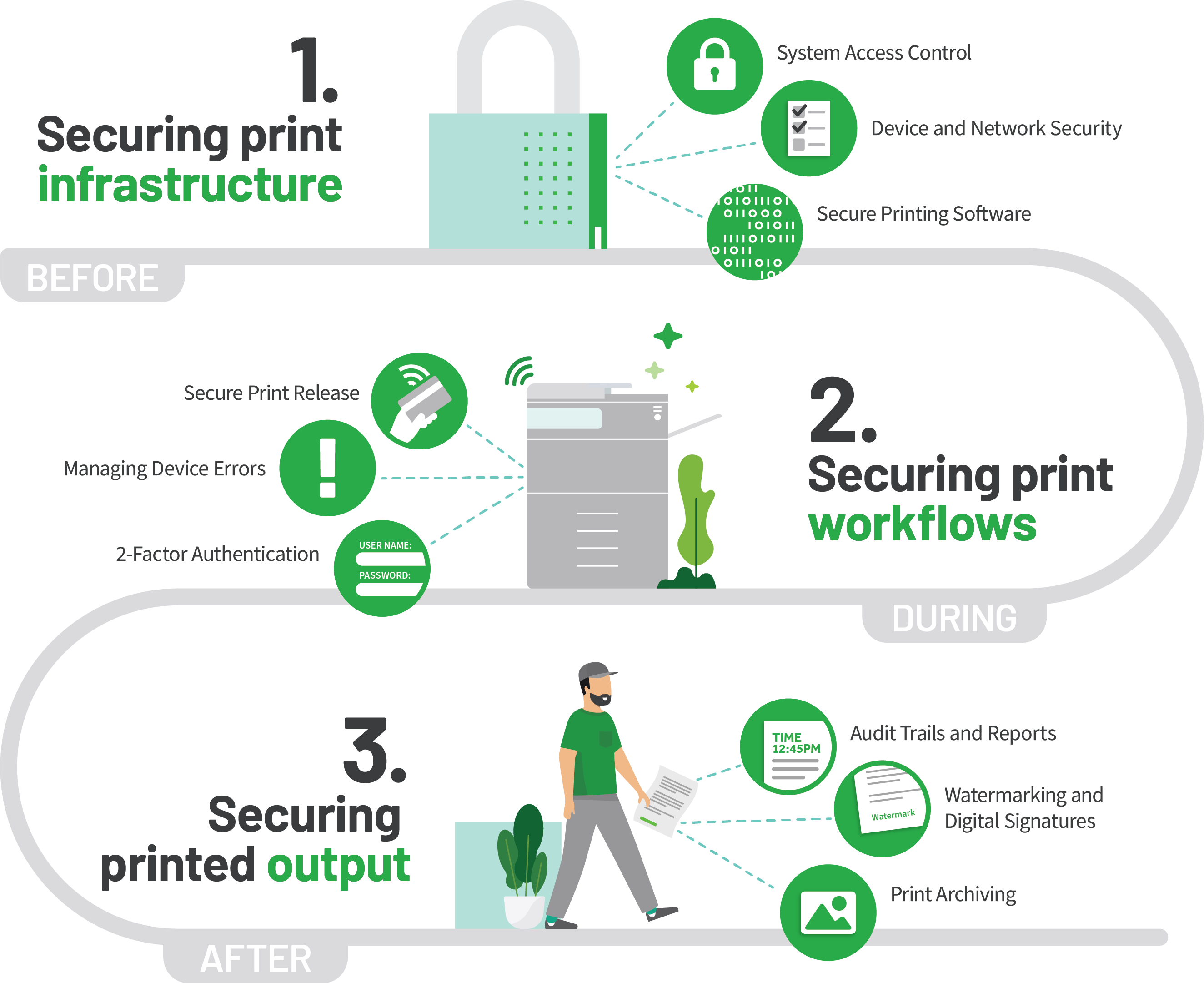When you think of IT security, you might not immediately think of your printer. But you should. Printers and printed documents are the Pandora’s Box of business confidential information.
Printers talk to lots of sensitive data. They also transform digital files into physical files. And when something can be held in your hands it can also be lost or stolen.
But print documents are also vulnerable when they’re in their digital form. Data traveling from devices to computers can be snatched by malicious actors.
Who wants your print jobs? Everyone from competing businesses to disgruntled employees to just old-fashioned thieves who want to hold your sensitive information for ransom.
Here are the 7 most common print security threats that you should be aware of. So you can implement a secure printing solution to protect your business and your people.
1. Forgotten print jobs in the printer tray
If you forget your print job in the printer tray it can be accidentally picked up and transported anywhere. Or, in a scarier scenario, discarded documents can be intentionally taken and passed onto the wrong pair of eyes. This can result in embarrassment in minor cases. In the worst examples, it can result in big problems for your business!
2. Misplaced print documents
Beyond the printer tray, it’s incredibly common to leave behind your sensitive documents in a public place. Say, left on a seat on the train or bus. Or left behind with a half-finished latte at the cafe. It’s a very human mistake to make.
But an error that can expose your business secrets to the entire world. Or maybe just that dodgy-looking guy in the cafe. Just as bad.
3. Data in-motion attacks
After you’ve pressed print, and is waiting to enter the print queue, your print data is at rest. When it’s moving from the device to the printer it’s considered in-motion.
During this part of the print job’s journey, your print job can be intercepted by attackers using malware or spyware. They can either change or take the data for their nefarious pirate-like desires.
4. Printer hacks
If your printers and MFDs aren’t appropriately physically or digitally secured, they are vulnerable to being hacked onsite or remotely. Hackers can exploit network infrastructure and vulnerabilities using tools like remote code execution and social engineering.
Then there’s the literal physical security of your devices like bolts and padlocks. If your printers aren’t secure in place, attackers can physically breach your premises and hack your devices directly.
5. Device theft
We’ve mentioned the physical security of your hardware. That is making sure printers and MFDs are secured to your premises. If your device can be easily removed, infiltrators can access stored information like usernames, passwords, print job data, and other business details. This stored information can be exploited, or attackers can leverage this data to then hack your network.
6. Inappropriate document and/or device disposal
Don’t need that document anymore? Well, I’ve got some unfortunate news for you… If you just crumple it up and throw it in the bin, that paper ball is now a security threat.
Shredding your documents is a step better, BUT, shredded documents can still be pieced back together. It is imperative to your business security that printouts which are no longer needed should be appropriately destroyed so they don’t pose a security threat.
7. Paper jams
This isn’t a super obvious one but bear with me. Say you’re printing a sensitive document and the printer jams, but you’re in a rush. So you print to another printer, grab your document and meet your deadline.
But that document was printed. And it’s in the printer. It’s just jumbled up in the rolling ribbons. But if someone else were to firmly remove it, it’s still readable. And thus you have a document duplicate that presents a security risk.
How do you protect your workplace from security threats?
Fresh out the box, printers need a little help to be a little better. Print management software makes your printers smarter, and protects your organization from potential security threats.
5 secure printing solutions to protect your documents
1. Secure Print Release
Shared printers no longer become a hotbed for forgotten or misplaced documents by introducing an automatic hold and release queue. Documents don’t print until the user authenticates at the device with a secure form of identification.
2. Encryption
Encryption is the backbone of IT security. What does it mean? Your data gets scrambled into unreadable code that can only deciphered with a key. You can use encryption to protect all the data transmitted on your network.
Some software also provide end-to-end encryption where the code is scrambled on the sending device and can only be decrypted at the location device. So your data is protected at every touchpoint of its journey.
3. Access Control
Manage the who and the how of printer access so that only users your administrator grants authentication and authorization to can print. This also includes tools after the document has been printed like auditing, logging, and watermarking to ensure you can trace back documents to the source.
4. Physical security
You thought I was joking each time I mentioned padlocks and deadbolts? But physically fastening your devices on premises prevents theft and unauthorized access. Embedded print software also ensures any interaction with your device is overseen by a secure print solution.
5. Regular software and firmware maintenance
Regularly updating software and firmware and maintaining your devices regularly protects your print system from security threats. Software updates contain patches for recent vulnerabilities and deliver new security features.
They also remove deprecated and unnecessary features that could be potential exploits for network or device attacks.
Protecting the print lifecycle

Security threats exists across three stages of a printed document’s lifecycle. Your data and information can be exploited before you press print, during the printing process, and after you’ve pressed print.




